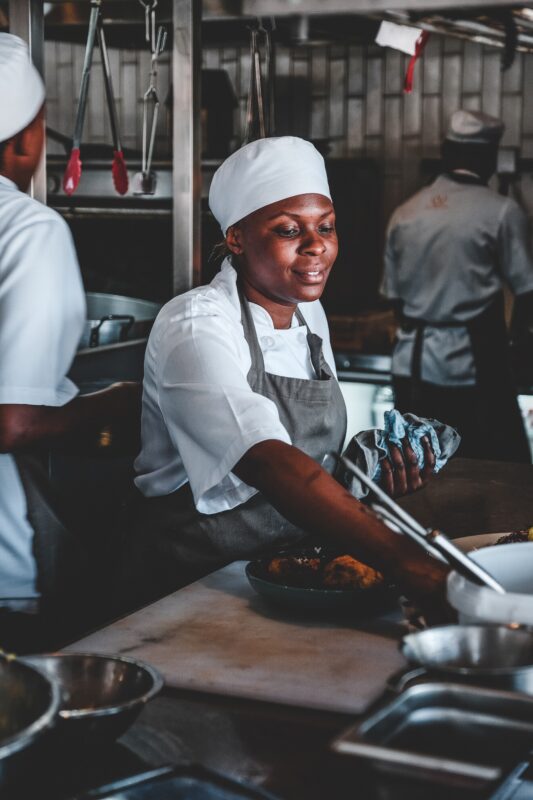Today is International Women’s Day, a global holiday that celebrates the social, economic, cultural and political achievements of women whilst highlighting specific areas for continued growth and improvement. This year’s theme focuses on equity with the campaign #EmbraceEquity.
Whilst equity and equality both strive to create equal opportunities for all, equity encourages the provision of varying and specific levels of support reflective of the difficulties that a marginalised group may face. In honour of this, we wanted to explore the role of women within the industry and the ways in which the independent food and drink sector can #EmbraceEquity and get women back into the kitchen.
If we cast our minds back to the not so distant past, it was once thought that a woman’s place was solely in the kitchen. Though domestic roles within the household have changed over the years, in spite of the long established view that women ‘belong in the kitchen,’ a 2017 report from the Office for National Statistics (ONS) revealed that only 17% of chef positions in the U.K were held by women. Whilst our childhood memories may be filled with images of our mothers cooking in the kitchen, this has rarely been echoed in the hospitality industry and there is a clear delineation between who one envisages when thinking of a professional chef versus a domestic cook. Jamie Oliver and Mary Berry are viewed very differently by the public despite Mary Berry having a qualification from Le Cordon Bleu. That is to say, the title of domestic cook is readily open to women, whilst the moniker of professional chef has been somewhat monopolised by men. A survey from 2022 reiterated that more is needed to be done to persuade women to join, and stay within, the hospitality industry. The study highlighted the necessity for equity to solve specific problems that women were facing in the industry such as a lack of career progression, disproportionate pay and hostile work environments. Subsequently, the study called for clear progression opportunities, equal pay and diverse working environments in order to create an equal playing field for women working in professional kitchens.
However, there is arguably hope on the horizon and research by University College London emphasises the integral role of women within street food. Though the study’s focus is women in Asian, it underscores important comparators by arguing that traditional roles of women in the kitchen often combine with the economic roles of women, especially for those in more rural areas. If we transpose this argument to the U.K, in more rural parts of the country women have historically sold their homemade food at market stalls in order to supplement their household income; debatably the very first street food markets. The study argues that the acceptability of this practise is often lost the further one heads into the city, however just as street food has continued to grow in popularity across major cities in the U.K. so too have the number of women running street food businesses. A government report on the hospitality industry post-covid, detailed how the industry had a higher proportion of women in leadership positions at 21%, compared to 15% across all sectors, suggesting that whilst there is still work to be done, the industry is making steps in the right direction to foster women in leadership.
Whilst there is still much needed improvement in professional kitchens, it would be short sighted to accuse the industry as a whole of failing. Street food businesses appear to have the necessary space to foster women’s careers and create clear paths to leadership positions and it is important that those within the industry take the time to discover why street food makes this possible. In so doing, the industry can offer equitable change, showcasing a genuine desire to create equal, more diverse spaces.
In honour of International Women’s Day and Women’s History Month we will be sharing the stories of inspirational women within the industry. Read more about Allie and Suze of Lilly Mills Drinkery, Holly of Captain Hank’s and Shereen of Back-a-yard, to name but a few. You can keep an eye out for our other features celebrating women in the industry here.
You can learn more about International Women’s Day here and about the work of those within the industry to improve representation, here.





 Featured Training
Featured Training
OUR MEMBERSHIP
We're here to help make your catering business a success. Whether that be starting up or getting on top of your compliance and marketing. We're here to help you succeed.
Want our latest content?
Subscribe to our mailing list and get weekly insights, resources and articles for free
Get the emails